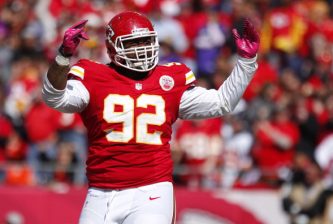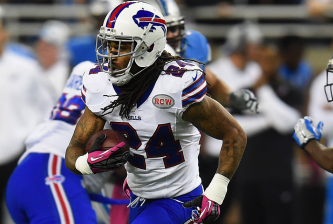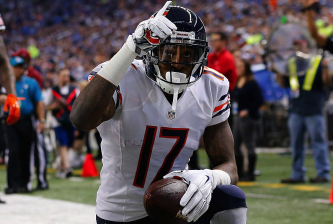No matter the era of football, the NFL will never have a league where every starting quarterback plays up to the standard of what a quality NFL quarterback should be. The lack of 32 quality quarterbacks leaves a handful of teams starting quarterbacks that can keep the team afloat, and a good number of others are left with outright bad quarterbacks. The group of quarterbacks meant to keep teams afloat for the time being are often recycled. Not only are the players themselves recycled, like Ryan Fitzpatrick and Josh McCown have been, but a specific archetype that makes up most of this middling group is recycled. This archetype is a player who is smart enough to avoid blatant mental errors, has arm talent that barely surpasses the threshold required to have success, throws much better over the middle of the field than toward the boundary, struggles to play outside of the system and often takes the easier throw instead of the gamble. Kirk Cousins fits this mold.
Before Cousins, there was Kyle Orton. Orton was a predictable passer, but he avoided forceful turnovers and threw an accurate enough ball, making himself useful enough to be used by team after team as a bridge to a younger quarterback or as a serviceable spot starter in place of an injured starter. Cousins himself is too young to have been used as a bridge to a younger quarterback, but he was drafted initially as insurance in case something happened to Robert Griffin III. After an outstanding rookie season, Griffin battled knee injuries and no longer looked like the confident passer he once was. Griffin’s struggles and inability to stay healthy lead to Cousins taking over the reigns. As the full time starter in 2015, Cousins has proven that he is, at least, a quality insurance policy quarterback.
Cousins is not playing to create offense. He is not an aggressive passer, nor is he athletic or inclined to leave the pocket. Cousins plays for efficiency and possession- a play style that was ingrained in him during his time at Michigan State under the methodical Mark Dantonio. The pocket is Cousins’s home and the offensive system is his job. Both out of demeanor and inability, Cousins seldom strays from his job. Cousins throws either the primary read of the “hot”/dump-off pass on nearly every play.
Just as it was for Orton, this methodical decision-making system is a gift and a curse for Cousins. The benefit is that predetermining a receiver makes it easier on the quarterback when he has to set his feet and load up for the throw. With the process of the throw being cleaner, the throw is more likely to be accurate than if the quarterback had been going from read to read and not setting to throw until a pass rusher was nearly in his face. Conversely, this style of play is predictable and allows defenses to get a jump on throws from time to time, assuming they have been doing proper work in the film room. Dominique Rodgers-Cromartie of the New York Giants, for example, plays one step ahead of Cousins because he can tell when Cousins is going to throw at him. Below are a handful of plays in which Rodgers-Cromartie is clearly defending a throw because he knew where Cousins was going to throw as soon as the ball was snapped.
Cousins’s methodical play style can be made up for by extreme mental acuity (a la Tom Brady) or, to a lesser extent, athleticism (a la Tyrod Taylor), neither of which are traits Cousins has. A speedy mental process will help a quarterback get the ball out before pressure can arrive, while athleticism can allow a quarterback to bail out of the pocket and buy himself time. Without either trait, Cousins is left to be a statue in the pocket that needs his receivers to get open and do so quickly. Cousins’s mental speed can sometimes fail him, leaving him stuck in the pocket with the ball. Instead of moving out of the pocket, testing a risky throw or throwing the ball away, Cousins stutter steps all around the pocket in a frantic search for an open receiver. Though, by the time Cousins finds a way to get the ball out, he is often being taken down by an opposing pass rusher.
This, in a sense, creates an illusion that Cousins isn’t making bad plays. The idea is that a bad play from a quarterback would be an incomplete pass because of the nature of the position, but taking an unnecessary sack or hit can be just as damping to a drive. For a player like Cousins, it is more about the plays that don’t happen that makes them unappealing. Though, as said before, teams covet players like Cousins in proper context.
Cousins has done a fine job for Washington. Seldom is he outright awful, and seldom does he light a defense up. More often than not, Cousins can be counted on for a solid performance that will allow Washington to win so long as their defense does not implode. At 27 years old, Cousins has maybe a year or two left to show improvement and prove that he can be more than a quarterback who simply keeps the team out of trouble. That said, it is more than likely that Cousins is close to being capped out and his only improvement over the rest of his career will be a slight upgrade in how quickly he processes the game.
Ideally, Washington retains Cousins on a reasonable two or three year contract. This would be best for both parties. A short, reasonable contract still implies that the job is Cousins for the time being, but also gives the team a fair amount of freedom in keeping the door open for a better quarterback to step in. A long-term deal could set Washington back for a while if Cousins does not show any improvement, and Cousins does not have a valuable enough ceiling as a player to be a worthwhile investment as a long-term option.
Washington is in a sticky wicket. If they want to play it safe, their best bet is to give up Cousins unless he is willing to take a short-term deal, then play the quarterback carousel and sign a stop-gap to prepare for taking a younger quarterback in the near future. Though, with as desperate as teams are for quarterbacks and with as dysfunctional as the Washington front office is, it would be fair to assume Cousins will play for Washington for years to come on a contract that is worth more than he deserves.




